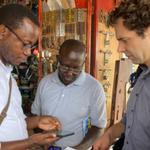Long-term effects of the COVID-19 pandemic on domestic resource mobilisation in sub-Saharan Africa
Covid-19 and DRM: A challenge to achieving the SDGs
Challenges to effective DRM in sub-Saharan Africa
How to cite this publication:
Odd-Helge Fjeldstad, Anna Gopsill, Ingrid Hoem Sjursen and Ole Therkildsen (2021). Long-term effects of the COVID-19 pandemic on domestic resource mobilisation in sub-Saharan Africa. Bergen: Chr. Michelsen Institute (CMI Brief 2021: 4)
Since late 2019, the COVID-19 pandemic has been spreading globally. The pandemic has affected all aspects of global society and has caused specific challenges for both the government and private sectors in most countries. While we do not yet know the full impact of the pandemic on poor African countries, we already know that the impacts on economies, health conditions and politics are significant – and will continue to be substantial. In this brief, we discuss the long-term implications and effects of the pandemic on Domestic Resource Mobilisation in sub-Saharan Africa. The brief builds on the report Implications of the COVID-19 pandemic for revenue generation in poor African countries.
Main points
1. The pandemic’s largest impact on economic growth so far has been in tourism-dependent economies.
2. In Tanzania, for example, the GDP growth rate fell from 5.8% in 2019 to 2.0% in 2020 and per capita growth turned negative for the first time in 25 years because of the pandemic.
3. For poor countries, which already faced significant underfunding of their Sustainable Development Goals (SDGs), the pandemic has both increased the need for more revenue and made its domestic resource mobilisation more difficult.
Introduction
Since late 2019, the COVID-19 pandemic has been spreading globally. The pandemic has affected all aspects of global society and has caused specific challenges for both the government and private sectors in most countries. While we do not yet know the full impact of the pandemic on poor African countries, we already know that the impacts on economies, health conditions and politics are significant – and will continue to be substantial. Some observers think that the impacts could be worse than the effects of the 2008 financial crisis (Lustig and Mariscal, 2020). Globally, GDP in 2021 is expected to be 3.2% below pre-pandemic projections (World Bank, 2021a). If this low growth is sustained, the average real GDP per capita in sub-Saharan Africa (SSA) will be back to its 2008 level. Thus, the COVID-19 pandemic may wipe out the economic and development gains that SSA has achieved over the past fifteen years. Government revenues in SSA in 2020 are expected to fall below pre-COVID-19 projections by about 2.3 percentage points of GDP (IMF, 2020). Sub-Saharan Africa’s recovery, while helped by spill-overs from the global recovery, is expected to remain fragile given the slow pace of vaccination and delays to major investments in infrastructure and the extractives sector.
Domestic Resource Mobilisation (DRM) has been recognised by the IMF as “one of the most pressing policy challenges facing” sub-Saharan African countries (IMF, 2018: 31). Similarly, DRM is reflected in the UN Sustainable Development Goals, under SDG 17.1: “Strengthen domestic resource mobilisation, including through international support to developing countries, to improve domestic capacity for tax and other revenue collection.” This highlights the importance of DRM in development efforts, and specifically in targeting relevant policy-making.
According to a USAID definition, DRM is: “the process through which countries raise and spend their own funds to provide for their people” (IMF, 2018). As such, it is the long-term path to sustainable development finance. However, increasing revenues is not a silver bullet. Additional revenues will only lead to improved development outcomes if they are spent on improving peoples’ lives and enhancing the state’s institutional capacity to provide productive public services in an accountable and equitable manner.
Covid-19 and DRM: A challenge to achieving the SDGs
As the economies of poor countries slow down due to the pandemic, poverty and inequality will increase, probably significantly. Consequently, the funds needed to counteract these trends through taxation, loans, aid and remittances will grow. In the short term, some 80–395 million people could fall into extreme poverty globally, depending on the extent of the economic shock from COVID-19. For SSA, the World Bank estimates that it could range from 33 to 37 million people. In Tanzania, the crisis could push an estimated additional 600 000 people below the poverty line (World Bank, 2021b).
In a recent study, Zeufack and co-authors document that the pandemic has impacted economies in SSA through three main channels:
- the drop in domestic production resulting from lockdowns and other restrictions on business operations;
- the impact on the demand for goods and services as lockdowns reduced household incomes; and
- the disruption to international tourism, global trade and its effects on commodity prices, exports and investments (including foreign direct investment).
The largest impact on growth so far has been in tourism-dependent economies, but oil-exporting countries and other commodity- intensive countries have also been hit hard. In East Africa, disruption to the tourism industry and lockdowns have caused substantial slowdowns in Ethiopia, Kenya and Tanzania. In West and Central Africa, the decline in growth is driven mainly by the reduction of oil exports. It is expected that fragile countries where the state has limited capacity to carry out vital governance functions, including security and provisions of basic services, will experience a strong decline in growth as the pandemic aggravates the drivers of fragility. Many poorer countries were already struggling to meet the targets set by the SDGs before the outbreak of COVID-19 (Andersen and Therkildsen, 2019), and this situation has only gotten worse since the beginning of the pandemic. Therefore, improved domestic resource mobilisation is as important as ever. Although with often considerable country variations, DRM is driven by a combination of economic, political, institutional and social factors. For instance, DRM is typically higher when the manufacturing and service sectors are larger, the country is more urbanized, the political situation is stable, there is political support for tax reforms, the tax administration is relatively effective, and citizens trust the government. The global economy and international conjunctures and donor influence also impact DRM.
Challenges to effective DRM in sub-Saharan Africa
The barriers to broader public engagement for DRM remain substantial in many countries. Limited trust in governments and tax authorities, especially in fragile states, undermines the potential for constructive tax campaigning. Moreover, the trend towards more authoritarian rule across the world, including in SSA, poses a serious challenge to such support. The urgency of increased revenue mobilisation brought about by the COVID-19 pandemic may motivate ruling political elites to push for more coercive collection methods in order to reach the revenue targets. We can hope that instead the pandemic will motivate ruling elites to interact more constructively with taxpayers and establish a dialogue based on mutual understanding of the challenges. For this to succeed, dialogue with and support from civil society, including business associations, will be important. DRM can only become a catalyst for broader improvements in people’s lives if the money raised is translated into public expenditure that also improves the state’s capacity to transparently deliver equitable public services. In other words, a focus only on increasing revenues is is clearly inappropriate. DRM must be considered in broader terms. ‘Leaving no one behind’ in poor and fragile countries is a desirable goal, but difficult to achieve. From a DRM perspective there are two major obstacles. The fiscal space for significant broad-based redistribution is very limited in countries with revenue-to-GDP ratios of around 15% or below. Equally important, redistribution through taxation requires strong political coalitions to push that agenda.
Compared to neighbouring countries, the Tanzanian economy has coped relatively well with the pressures of the COVID-19 pandemic. However, economic growth in the country has still slowed significantly – the GDP growth rate fell from 5.8% in 2019 to 2.0% in 2020 and per capita growth turned negative for the first time in 25 years (World Bank, 2021b). These challenges come in addition to preexisting challenges in the financial sector.
In March and April 2020, the Tanzanian government took measures to alleviate the
negative health and economic effects of the virus. These policies included movement restrictions, bans on large gatherings, school closures, and the cancellation of international flights. In addition, the government took steps to support the private sector through measures to help with the verification and clearance processes for VAT
payments and refund arrears. The Bank of Tanzania also reduced the discount rate and the minimum reserve requirement with the aim of creating more liquidity in the financial system.
However, these measures were moderate when compared to measures implemented by other countries in the region. The country has also faced complications due to the absence of official information about COVID-19 mortality and morbidity rates, making it difficult to assess the effectiveness of the public health response. The late President Magufuli’s denial that the COVID-19 pandemic is a serious threat to the economy and
health conditions of the country were not helpful either.
The country’s tourism sector has been particularly hard-hit by the pandemic. The sector is projected to lose 77% of its projected revenue in 2020/21, and lose 50% of direct jobs. Tourism-related suppliers and subcontractors are already facing severely reduced demand as domestic and international firms and consumers adopt precautionary behaviours.
According to a recent World Bank report, the success of the government’s efforts to improve the investment climate largely depends on sustainable growth past 2021. The economic outlook of the country remains uncertain and the country’s growth prospects depend largely on two factors: first, the successful global rollout of COVID-19 vaccines; and second, the implementation of good domestic policies to promote swift economic recovery.
The role of donor support to DRM
Donor support to DRM in developing countries is not new, but since the beginning of the pandemic, there have been several new international initiatives aiming to lessen or alleviate the impact of the pandemic on the economies of poorer countries. Such support to DRM can be a catalyst to increase revenue and promote economic recovery after the effects of COVID-19, but it also faces a number of challenges.
Support to DRM must be demand-driven, context specific, coordinated and with a long-term perspective. Taxation is both a technical and a political issue – and must be treated with a country-specific approach. The crisis-level impacts of COVID-19 may motivate some governments to start new tax initiatives for which donor support may be relevant. Support to DRM in fragile states is particularly challenging because they typically have legacies of conflict related to economic and administrative destruction and political divisions. The IMF has moved towards a more forthright approach to tax policy and enforcement by arguing that “increasing the tax-to-GDP ratio by 5 percentage points by 2030 is a reasonable aspiration for poor countries”. We agree that collecting more revenues is possible and necessary, but IMF’s ambitious position was unrealistic before the pandemic and even more so now. More realistic projections should take into account that revenue-to-GDP per year in many countries in SSA increased by modest 0.1% to 0.2% over the period 1987-2018.
Aggressive revenue mobilisation is likely to negatively affect many taxpayers who are struggling to survive. Under present conditions, such an approach could further undermine the legitimacy of the tax system, as well as citizens’ trust in the tax administration and the government in general in some countries. A tradeoff between the urgent need to raise more revenues in a country and ways of doing so could therefore be found under the slogan hurry slowly! From this perspective, and especially in fragile states, it is important to strengthen the Ministry of Finance’s capacity to formulate tax policy and perform realistic revenue budgeting. Moreover, there is a need for training and support to improve the technical capacity and skills of Members of Parliament in the areas of public finance and tax policy, including how to read and understand government budgets.
A lack of common understanding among donors on the best approaches continues to impede coordination and DRM progress on the ground in recipient countries. Support to international tax networks could alleviate these problems, although they can also have coordination problems. There are several options for donors to consider supporting to overcome some of the coordination issues including:
- The Global Platform for Cooperation on Tax which was established in 2016 and includes the World Bank, IMF, OECD and UN. It aims to facilitate effective collaboration in the areas of tax and capacity development.
- The African Tax Administration Forum (ATAF) aims to strengthen the more general analytical capacity of African revenue administrations and ministries of finance. It is also engaged in taxpayer education programmes.
- The African Economic Research Consortium (AERC) is a regional research and teaching organisation which runs academic courses or degrees in public economics, including fiscal reforms, taxation and public spending – this would help to meet the need to increase the technical and analytical skills of tax-policy and tax-administrative staff.
- The Addis Tax Initiative (ATI) is a multi-stakeholder partnership that aims to enhance DRM in partner countries. The new ATI Declaration 2025 is rooted in the 2030 Agenda for Sustainable Development (SDG targets 17.1, 10.4 and 16.6) and aims to strengthen DRM in developing countries by ‘improving capacities to collect taxes and other revenues in a transparent, accountable, and equitable manner’.
Support to such networks and multi-stakeholder partnerships can also be venues for the communication of donor experiences to influence priorities and enhance their normative influence on their revenue mobilisation work.
Conclusion
A focus on taxation not only reflects the need to finance public spending, it is also a recognition that taxation is central to growth, redistribution and broader state-building and governance goals. More taxation is positively associated with more accountable states, control of corruption, voice and accountability, government effectiveness and political stability. However, there is no ‘one-size-fits-all’ approach to the issues outlined in this brief, and any interventions must be designed by taking into account specific country-contexts. Indeed, whichever form future support to DRM may take, it is essential that it suits the individual country’s tax system and the political context surrounding taxation.
It is still too early to predict the full economic effects of the pandemic – and inequality may increase due to COVID-19. However, major redistribution through domestic taxation is unrealistic in countries with revenue-to-GDP ratios below 15%
of GDP. Nor is there strong organised political support for such redistribution in poor African countries. Indeed, the national tax systems in some of these countries are already relatively progressive. Public expenditure patterns should also be analysed to establish the combined effect on inequality of who pay taxes and who benefit from them. At present data on this are scarce and of poor quality.
Policy recommendations
- DRM can only become a catalyst for improvement of people’s lives if the money is translated into productive public expenditure that also improves the state’s institutional capacity to deliver public services in an accountable and equitable manner.
- Increased domestic revenue mobilization in the aftermath of the COVID-19 pandemic is possible depending on a country’s specific situation and political economy, but it will not be easy: No silver bullet (“tax the rich”!) will generate substantial additional revenues on its own. Better utilization of a range of existing revenue sources is needed. An important opportunity for building political support for tax reform lies in putting more emphasis on the ‘demand side’, i.e. in building broader citizen engagement around taxation.
- Revenue administrations should be motivated to interact more constructively with taxpayers and establish a dialogue based on mutual understanding of the challenges. For this to succeed, dialogue with and support from civil society,
including business associations, will be important. - Donor support to DRM can be a catalyst through which to increase revenue and promote economic recovery after the effects of COVID-19.
- Donor support should be designed with the specific country contexts in mind, and support must be targeted strategically. It is essential to recognise that the tax systems and political economies in different countries are substantially different.
Suggested readings
Andersen, Ole Winckler and Ole Therkildsen. (2019). Can the SDGs in low-income countries be financed? And should we care? DIIS Working Paper 2019:2. Copenhagen: Danish Institute for International Studies.
Fjeldstad, Odd-Helge and Ole Therkildsen. (2020). Implications of the COVID-19 pandemic for revenue generation in poor African countries. DIIS Working Paper 2020: 13). Copenhagen: Danish Institute for International Studies.
IMF. (2020). Regional Economic Outlook, Sub-Saharan Africa: A difficult road to recovery. African Department. Washington D.C.: International Monetary Fund.
IMF. (2018). Regional Economic Outlook, Sub-Saharan Africa: Domestic revenue collection and private investment. Washington D.C.: International Monetary Fund.
Lustig, Nora and Jorge Mariscal. (2020). How COVID-19 could be like the global financial crisis (or worse). In Richard Baldwin and Beatrice Weder di Mauro (Eds.) Economics in the Time of COVID-19 (Vox EU, E-Book).
World Bank. (2021a). The global economy: On track for strong but uneven growth as COVID-19 still weighs. Washington D.C.: World Bank.
World Bank. (2021b). Tanzania Economic Update: Raising the bar - achieving Tanzania’s development vision. Washington D.C.: World Bank.
World Bank. (2020). Africa’s Pulse: An Analysis of Issues Shaping Africa’s Economic Future, Charting the Road to Recovery Vol. 22
Odd-Helge Fjeldstad

Ole Therkildsen

The TaxCapDev-network (phase III)





